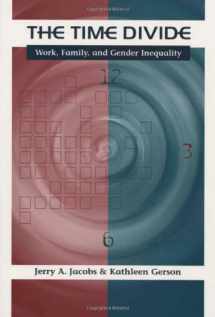
The Time Divide: Work, Family, and Gender Inequality (FAMILY AND PUBLIC POLICY)
Book details
Summary
Description
In a panoramic study that draws on diverse sources, Jerry Jacobs and Kathleen Gerson explain why and how time pressures have emerged and what we can do to alleviate them. In contrast to the conventional wisdom that all Americans are overworked, they show that time itself has become a form of social inequality that is dividing Americans in new ways--between the overworked and the underemployed, women and men, parents and non-parents. They piece together a compelling story of the increasing mismatch between our economic system and the needs of American families, sorting out important trends such as the rise of demanding jobs and the emergence of new pressures on dual earner families and single parents.
Comparing American workers with their European peers, Jacobs and Gerson also find that policies that are simultaneously family-friendly and gender equitable are not fully realized in any of the countries they examine. As a consequence, they argue that the United States needs to forge a new set of solutions that offer American workers new ways to integrate work and family life.


We would LOVE it if you could help us and other readers by reviewing the book
Book review



